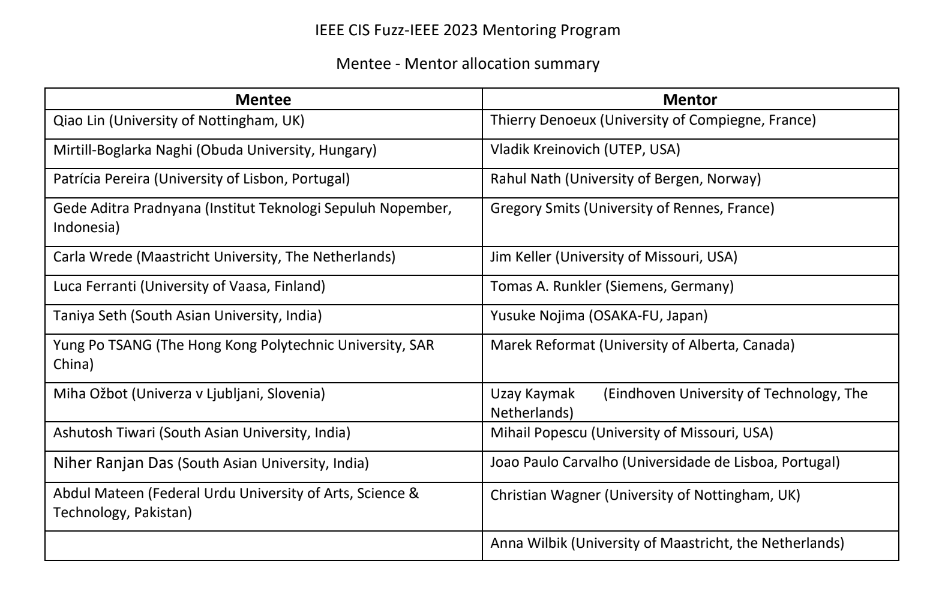Paper Development Workshop(PDW)
The purpose of the PDW is to provide the mentoring program’s participants the opportunity to hear from and engage with the editorial team(s) from the IEEE CIS flagship journals. The focus of the PDW is for potential authors to learn about paper development for publication in top journals and get hands-on feedback on their own papers. The PDW will be run by members (Editors-in-Chief and Associate Editors) of the IEEE Transactions on Fuzzy Systems (TFS) for FUZZ-IEEE. The editorial team will offer both an overview of the journal and its priorities, as well as small-group, hands-on sessions for participants. The PDW will last for three hours.
Application to attend the PDW is REQUIRED, i.e. mentees are NOT automatically invited to the PDW. In order to apply, mentoring program participants are required to submit a draft journal paper (which may be based on their accepted conference paper), following these guidelines:
• All draft papers should follow the IEEE journal paper submission guidelines in format and size. Specifically, drafts may of course be shorter and be partially incomplete, but they should not exceed the maximum number of pages.
• As a minimum, all papers should include an abstract as well as draft versions of key sections, in particular highlighting contributions, methodology, experiments, results and conclusions. It is acceptable for some sections to be only minimally developed, e.g. as bullet points.
• Participants are encouraged to include clearly highlighted questions and areas for discussion in their draft papers.
To apply to the PDW, please register by 13 July 2023 by completing the webform and instructions here.
Note that successful applicants will be notified by 31 July 2023.
Note that IEEE CIS members will be given priority access to the PDW, and in the event of over-subscription, reviewer scores of the applicants’ accepted conference papers will be considered.
Who is it for?
The program is provisionally* open to all students and early career researchers who are presenting a paper at FUZZ-IEEE 023, with priority given to IEEE CIS student members. Students and early career researchers who are first authors of an accepted paper which they will present, will automatically be assigned a mentor.
Note:
•there is no formal restriction on who qualifies as an ‘early career researcher’;
•participation in the program is free of charge to registered presenters;
•depending on demand, the number of mentees accepted to the program will have to be limited. In this situation, IEEE CIS student members will be given priority and successful applicants to the program will be selected based on their paper review scores.
All presenters accepted to the mentoring program will be explicitly notified via email. Applications to participate in the program submitted after the Early Registration Deadline may not be considered.
How does it work?
Successfully mentees will be contacted via email prior to the conference. Before the conference, mentor and mentee contact details will be shared between them. Mentees are expected to drive engagement with their mentors, e.g. sending their accepted conference paper to the mentor in advance of their presentation so as to allow the mentors to read the paper and provide some feedback.
Mentee participants who would like to attend the PDW must submit their draft papers following the guidelines and respecting the deadline above. Again to clarify: the PDW is open for application to mentees, but in order to participate, you must apply as outlined above and be selected
If you have any queries regarding either the MMN or the PDW please feel free to contact the Mentoring Program team.
To apply to the PDW, please register by 13 July 2023 by completing the webform and instructions here
Note that successful applicants will be notified by 31 July 2023.
Note that IEEE CIS members will be given priority access to the PDW, and in the event of over-subscription, reviewer scores of the applicants’ accepted conference papers will be considered.
Jose Maria Alonso (CiTIUS-USC, Spain): ([email protected]
Amit K. Shukla (University of Jyväskylä, Finland): [email protected]
Christian Wagner (University of Nottingham, UK: [email protected]
Nelishia Pillay (University of Pretoria, South Africa: [email protected]


